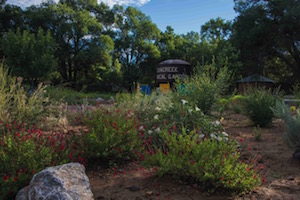 It may not feel like spring, but it’s not too early to think about what to plant in your garden. A great variety of attractive native plants are available to order at the Gila Native Plant Society’s 17th Annual Native Plant Pre-Sale. How does it work? You order plants in March and they will be ready for pick-up in late April, just before Earth Day. Choose from a wide selection of native trees, shrubs, flowers, cacti and grasses.
It may not feel like spring, but it’s not too early to think about what to plant in your garden. A great variety of attractive native plants are available to order at the Gila Native Plant Society’s 17th Annual Native Plant Pre-Sale. How does it work? You order plants in March and they will be ready for pick-up in late April, just before Earth Day. Choose from a wide selection of native trees, shrubs, flowers, cacti and grasses.
Why grow native plants in your garden? Once established, native plants conserve water and require less care than non-natives. They are more likely to resist disease and predation (many are even deer resistant!). Since they are adapted to our climate, they are more cold-hardy than non-natives and can withstand our strong sun. And they support local varieties of birds, bees, butterflies and other pollinators important to our region’s vitality.
Plants may be ordered in person or online. To order in person, come to the ABC Room in the Besse-Forward Global Resource Center at 12th Street and Kentucky on the WNMU campus on Saturday, March 23, 2019, between 10 am and 1 pm. GNPS members can help you decide which plants will work best in your yard. Great southwest gardening books will also be available for purchase.
To order online, go to the GNPS website here and click on “GNPS Plant Sale.” You’ll find photos of the plants available for purchase, along with information on their cold tolerance, their requirements in terms of elevation, water and sunlight, and their size when full-grown. Online ordering will be available through April 8th.
Plants ordered online or in person will be available for pick-up on Wednesday, April 17, 2019, from 9 to 11 am in the parking lot at 12th and Pope Streets across from to Gough Park.
The Gila Native Plant Society is committed to promoting education, research and appreciation of the native flora of the Southwest, encouraging the preservation of rare and endangered plant species and supporting the use of suitable native plants in landscaping. For information on programs, publications and membership, please visit here.